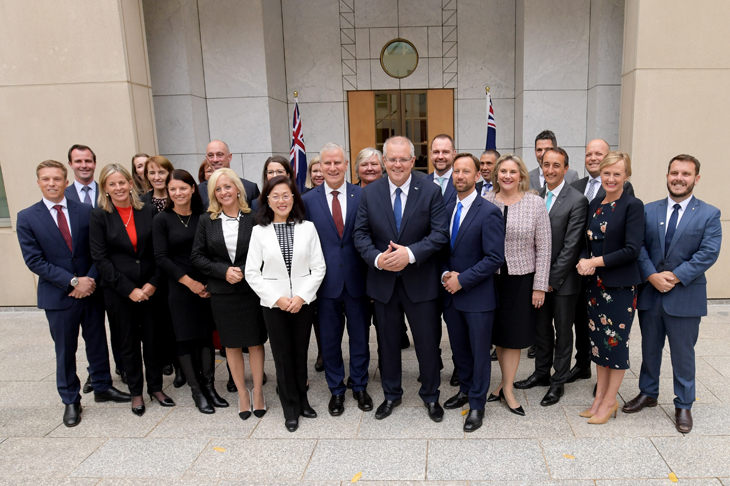As we speak, a bright new class of newly-elected MPs and Senators is assembling in the cities, towns and remote hamlets of Australia before leaving on that momentous trip to Canberra to begin their first parliamentary term. As this great confluence of humanity coalesces in the nation’s capital, The Spectator Australia Political Research Unit has been pondering what best it can do to ensure that they make the greatest contribution possible to the democratic project. In particular, we have been concerned to see that they do not fall into difficulties by not being able to understand the strange language they will hear in the equally strange world of government and politics they are about to inhabit. Moreover, it is important that they should also be able to use the same language to converse with the other myriad groups with whom, from now on, they will be associating. After all, accompanying them will be a veritable army of members of staff and advisers. Waiting for them will be a vast array of public servants, lobbyists, diplomats, think tank apparatchiks and academics who are only too ready to share the vast knowledge they have accumulated. And ready to note every statesman-like gem that falls from their lips will be yet another army of media personnel. We therefore feel that the most valuable contribution we can make is to provide new members and senators with a running guide to the words and phrases they will hear most commonly in Canberra and what their interlocutors really mean when they use them, which may well be different from the normal or literal meaning ascribed to the same words. Here then, with our best wishes for a successful parliamentary career are the leading contenders.
We have a broad range of options: We haven’t the faintest idea what to do.
We have always been clear about this: We have fooled everybody in the past, so there is no reason why we should change now.
Let me be perfectly clear: I will see if I can bamboozle you.
Trading partners: the band of swindlers whom we have to go through the empty motions of being friendly with in commerce, but who would cut our throats if they had a chance and as fast as we would cut theirs.
Allies: (see: Trading partners).
Mandate: a policy the voters could have voted for, but did not, if they knew what we were talking about, which they also did not.
I’m right behind you: I will stab you in the back as quickly as you would stab me in mine.
I am under great pressure to stand: no-one has asked me to stand, but I am so vain that I will.
A lot of my friends have asked me to stand: I have no friends but I am buggered if I’m going to sit back while you stand.
I voted for you: I voted for you and all the other candidates as well.
Consensus: agreeing with me
Divisive: Disagreeing with me.
We have got the balance just about right: It’s a complete mess, but if people are as stupid as we know they are, they will think this was well-planned.
It is a compromise, but I can live with it: it is such a mess that it does not mean anything and it will not work, so it will probably be well received.
This must never happen again: it will happen again and it will be worse, because we do not know how it happened and have learnt nothing from it.
The file is top secret/eyes-only/secret/ commercial-in-confidence/ sensitive: we put the file in a filing cabinet, locked it, lost the key and sent the cabinet to the auction rooms in Belconnen. (Damian in Records has a receipt, but he is on a fact-finding mission to Kazakhstan on Security in the Age of Terrorism).
Initiative: a government scheme imposing new taxes and regulations, designed to prevent the citizen from doing anything not already prohibited.
Reform: making things worse.
Vision: an hallucinatory delusion afflicting decision-makers into believing they can improve something.
Within Market Expectations: an economist’s explanation for why a prediction was even more widely astray of its mark than usual.
Fact-finding mission: free trip.
Foreign Aid: taxation extracted from the poor in rich countries and given to the rich in poor countries.
The Rules-based international order: the right to lure an opponent to your consulate with a lie, strangle and dismember him, suffer no penalty, and be accredited to the next human rights conference.
International law: a variable body of law made with no authority, designed to give sanctuary to terrorists and prevent their extradition to stand trial.
Moral (adj.): justification advanced for a policy with no logical, economic, legal or rational excuse for existing.
Free speech: obsolete, except for the right to express views approved by the ABC, the Age, or the SMH. Also: the right to prevent anyone else from expressing any other opinions.
My expenses were strictly within the guidelines: it was a complete waste of time and money, but I had a good trip and spent too much, although it was only your money and we wrote the guidelines to make sure that our spending always comes within them.
Implied term: a term in a constitution or contract which is not stated, was not intended and is not capable of being discerned other than by a High Court judge wondering for six months if it should be there and who concludes that it must have been overlooked because it is so obvious.
And a final word to the Class of 2019. Always remember that when a word is used it has the meaning that the person using it wants to give to it.
Got something to add? Join the discussion and comment below.
Get 10 issues for just $10
Subscribe to The Spectator Australia today for the next 10 magazine issues, plus full online access, for just $10.
You might disagree with half of it, but you’ll enjoy reading all of it. Try your first month for free, then just $2 a week for the remainder of your first year.















Comments
Don't miss out
Join the conversation with other Spectator Australia readers. Subscribe to leave a comment.
SUBSCRIBEAlready a subscriber? Log in